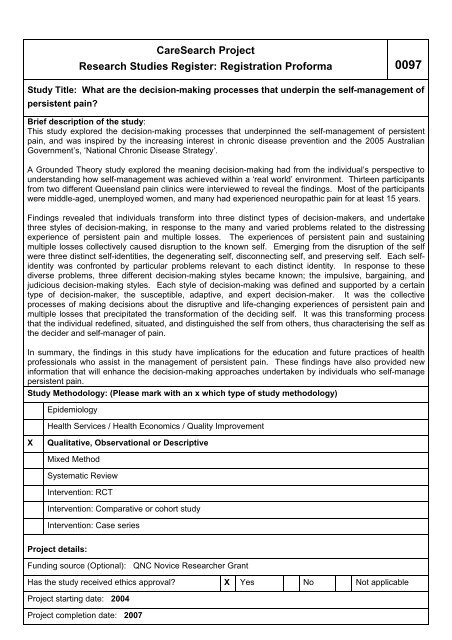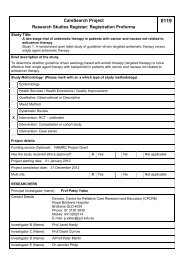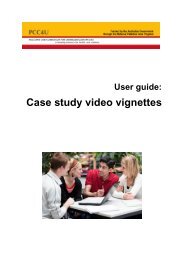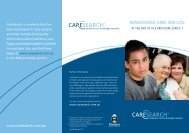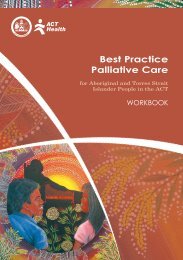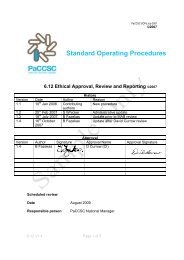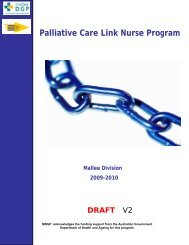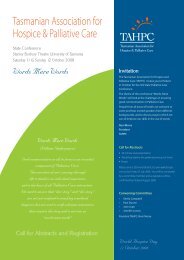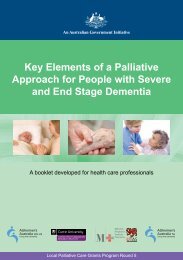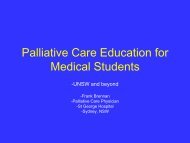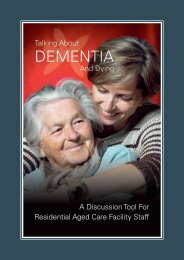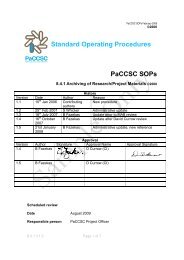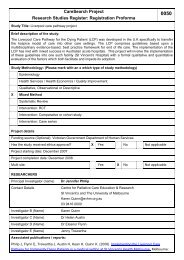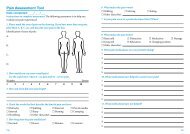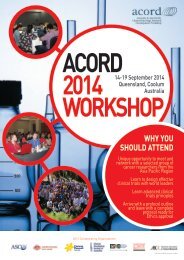What are the decision-making processes that ... - CareSearch
What are the decision-making processes that ... - CareSearch
What are the decision-making processes that ... - CareSearch
You also want an ePaper? Increase the reach of your titles
YUMPU automatically turns print PDFs into web optimized ePapers that Google loves.
C<strong>are</strong>Search Project<br />
Research Studies Register: Registration Proforma 0097<br />
Study Title: <strong>What</strong> <strong>are</strong> <strong>the</strong> <strong>decision</strong>-<strong>making</strong> <strong>processes</strong> <strong>that</strong> underpin <strong>the</strong> self-management of<br />
persistent pain?<br />
Brief description of <strong>the</strong> study:<br />
This study explored <strong>the</strong> <strong>decision</strong>-<strong>making</strong> <strong>processes</strong> <strong>that</strong> underpinned <strong>the</strong> self-management of persistent<br />
pain, and was inspired by <strong>the</strong> increasing interest in chronic disease prevention and <strong>the</strong> 2005 Australian<br />
Government’s, ‘National Chronic Disease Strategy’.<br />
A Grounded Theory study explored <strong>the</strong> meaning <strong>decision</strong>-<strong>making</strong> had from <strong>the</strong> individual’s perspective to<br />
understanding how self-management was achieved within a ‘real world’ environment. Thirteen participants<br />
from two different Queensland pain clinics were interviewed to reveal <strong>the</strong> findings. Most of <strong>the</strong> participants<br />
were middle-aged, unemployed women, and many had experienced neuropathic pain for at least 15 years.<br />
Findings revealed <strong>that</strong> individuals transform into three distinct types of <strong>decision</strong>-makers, and undertake<br />
three styles of <strong>decision</strong>-<strong>making</strong>, in response to <strong>the</strong> many and varied problems related to <strong>the</strong> distressing<br />
experience of persistent pain and multiple losses. The experiences of persistent pain and sustaining<br />
multiple losses collectively caused disruption to <strong>the</strong> known self. Emerging from <strong>the</strong> disruption of <strong>the</strong> self<br />
were three distinct self-identities, <strong>the</strong> degenerating self, disconnecting self, and preserving self. Each selfidentity<br />
was confronted by particular problems relevant to each distinct identity. In response to <strong>the</strong>se<br />
diverse problems, three different <strong>decision</strong>-<strong>making</strong> styles became known; <strong>the</strong> impulsive, bargaining, and<br />
judicious <strong>decision</strong>-<strong>making</strong> styles. Each style of <strong>decision</strong>-<strong>making</strong> was defined and supported by a certain<br />
type of <strong>decision</strong>-maker, <strong>the</strong> susceptible, adaptive, and expert <strong>decision</strong>-maker. It was <strong>the</strong> collective<br />
<strong>processes</strong> of <strong>making</strong> <strong>decision</strong>s about <strong>the</strong> disruptive and life-changing experiences of persistent pain and<br />
multiple losses <strong>that</strong> precipitated <strong>the</strong> transformation of <strong>the</strong> deciding self. It was this transforming process<br />
<strong>that</strong> <strong>the</strong> individual redefined, situated, and distinguished <strong>the</strong> self from o<strong>the</strong>rs, thus characterising <strong>the</strong> self as<br />
<strong>the</strong> decider and self-manager of pain.<br />
In summary, <strong>the</strong> findings in this study have implications for <strong>the</strong> education and future practices of health<br />
professionals who assist in <strong>the</strong> management of persistent pain. These findings have also provided new<br />
information <strong>that</strong> will enhance <strong>the</strong> <strong>decision</strong>-<strong>making</strong> approaches undertaken by individuals who self-manage<br />
persistent pain.<br />
Study Methodology: (Please mark with an x which type of study methodology)<br />
Epidemiology<br />
Health Services / Health Economics / Quality Improvement<br />
X<br />
Qualitative, Observational or Descriptive<br />
Mixed Method<br />
Systematic Review<br />
Intervention: RCT<br />
Intervention: Comparative or cohort study<br />
Intervention: Case series<br />
Project details:<br />
Funding source (Optional): QNC Novice Researcher Grant<br />
Has <strong>the</strong> study received ethics approval? X Yes No Not applicable<br />
Project starting date: 2004<br />
Project completion date: 2007
Multi site: X Yes No Not applicable<br />
RESEARCHERS<br />
Principal Investigator (name)<br />
Dr Cl<strong>are</strong> Fenwick<br />
Contact Details PO Box 1699, Oxenford, QLD 4210<br />
Investigator B (Name)<br />
Investigator C (Name)<br />
Professor Wendy Chaboyer<br />
Associate Professor Winsome St John<br />
Investigator D (Name)<br />
Investigator E (Name)<br />
Associated publications / reports:<br />
Topics (Admin only) Pain, Patients


